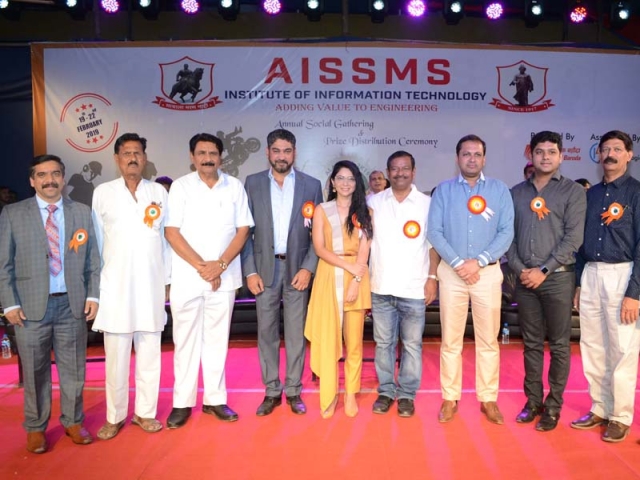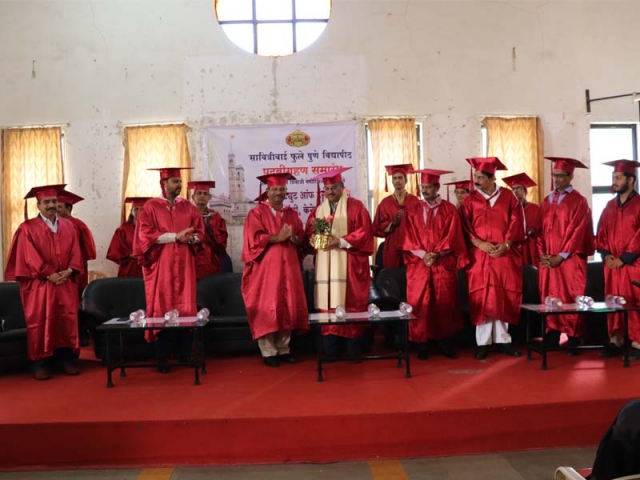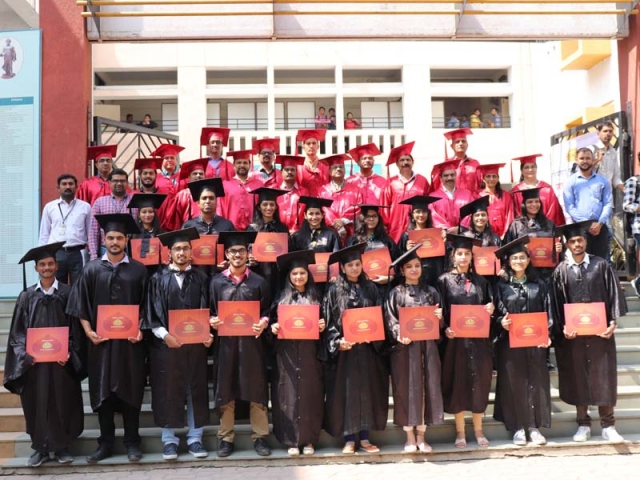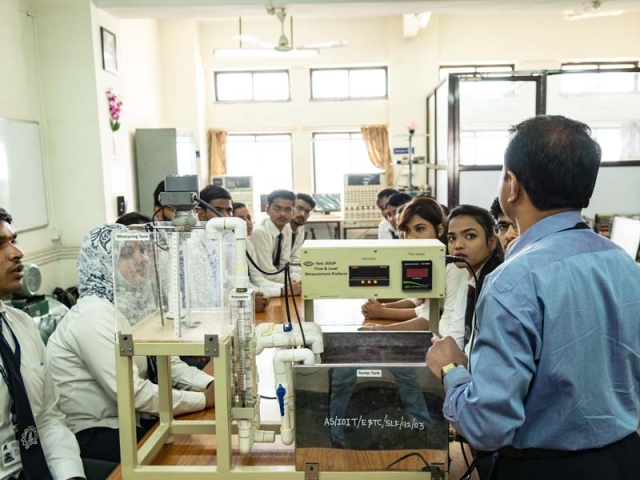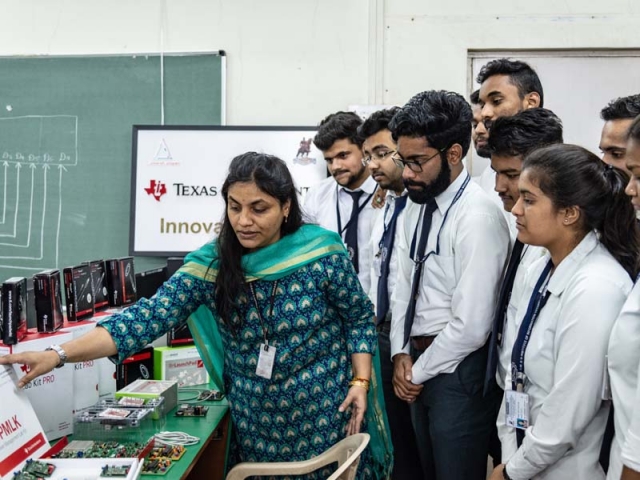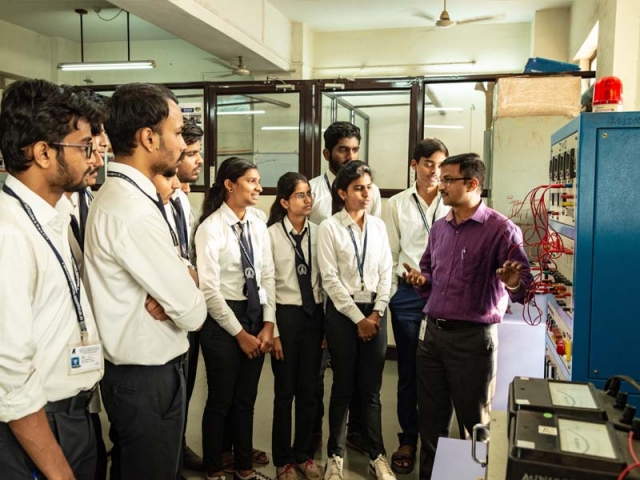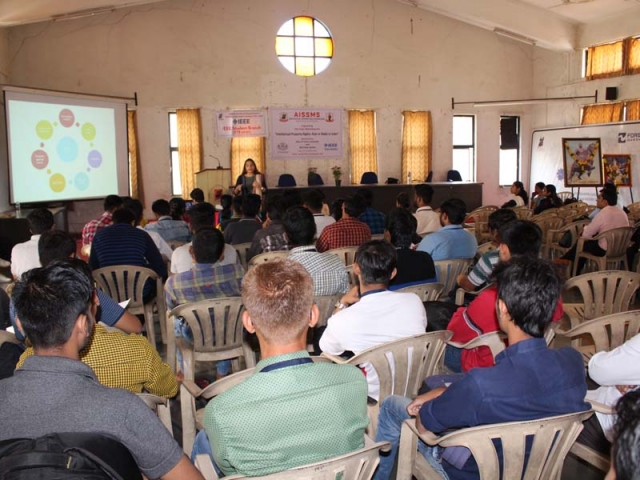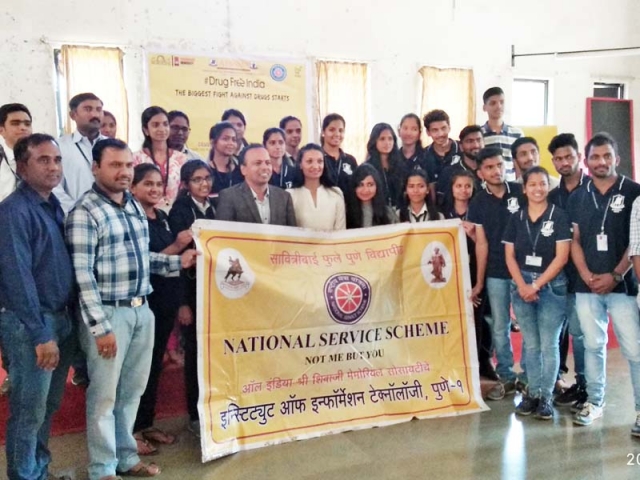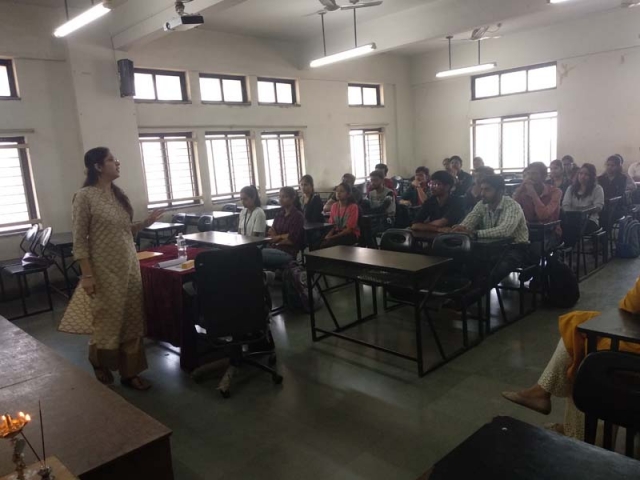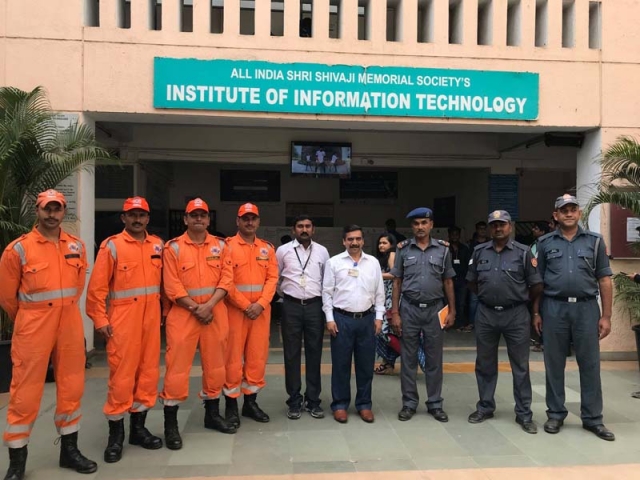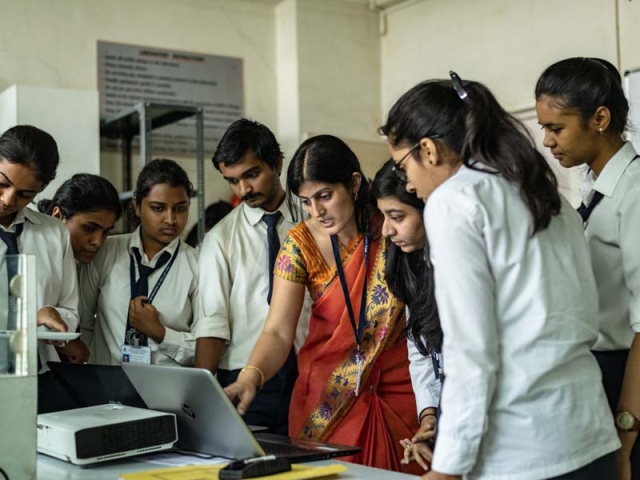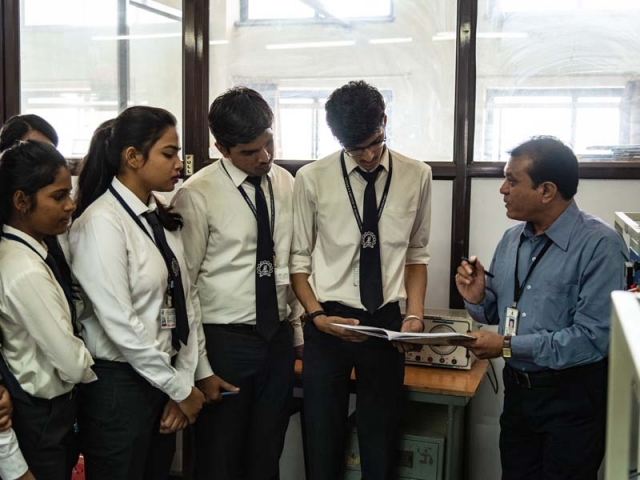Vision
To be known for imparting quality education in computer engineering to serve the changing needs of global industry.
Mission
1. To create an environment that fosters technical and professional growth to make graduates globally competent.
2. To develop industry ready professionals, researchers, and entrepreneurs to solve real world problems and societal issues.
2. To develop industry ready professionals, researchers, and entrepreneurs to solve real world problems and societal issues.
Program Educational Objective
PEO1: Work productively as successful computer professionals / entrepreneurs / researchers in global industry.
PEO2: Adapt latest technological skills to face challenges of the modern computing industry.
PEO3: Work in finance, healthcare, security and banking sectors as a team member or a leader with ethical values.
PEO2: Adapt latest technological skills to face challenges of the modern computing industry.
PEO3: Work in finance, healthcare, security and banking sectors as a team member or a leader with ethical values.
PROGRAM SPECIFIC OUTCOMES
PSO1 Problem Solving and Programming Skills: Graduates will be able to apply knowledge of procedural or object oriented programming to solve computing problems.
PSO2 Professional Skills: Graduates will be able to design and develop software systems using front end and back end technologies by following standard software engineering principles
PSO3 Professional Skills: Graduates will be able to analyse the algorithms and implement optimized solutions in the domain of machine learning, natural language processing, security and cloud computing.
PSO2 Professional Skills: Graduates will be able to design and develop software systems using front end and back end technologies by following standard software engineering principles
PSO3 Professional Skills: Graduates will be able to analyse the algorithms and implement optimized solutions in the domain of machine learning, natural language processing, security and cloud computing.
Program Outcomes
Engineering Graduates will be able to
| 1. | Apply the knowledge of mathematics, science, engineering fundamentals, and an engineering specialization to the solution of complex engineering problems. [Engineering knowledge] |
| 2. | Identify, formulate, research literature, and analyse complex engineering problems reaching substantiated conclusions using first principles of mathematics, natural sciences, and engineering sciences. [Problem analysis] |
| 3. | Design solutions for complex engineering problems and design system components or processes that meet the specified needs with appropriate consideration for the public health and safety, and the cultural, societal, and environmental considerations. [Design/development of solutions] |
| 4. | Use research-based knowledge and research methods including design of experiments, analysis and interpretation of data, and synthesis of the information to provide valid conclusions. [Conduct investigations of complex problems] |
| 5. | Create, select, and apply appropriate techniques, resources, and modern engineering and IT tools including prediction and modeling to complex engineering activities with an understanding of the limitations. [Modern tool usage] |
| 6. | Apply reasoning informed by the contextual knowledge to assess societal, health, safety, legal and cultural issues and the consequent responsibilities relevant to the professional engineering practice. [The engineer and society] |
| 7. | Understand the impact of the professional engineering solutions in societal and environmental contexts, and demonstrate the knowledge of, and need for sustainable development. [Environment and sustainability] |
| 8. | Apply ethical principles and commit to professional ethics and responsibilities and norms of the engineering practice. [Ethics] |
| 9. | Function effectively as an individual, and as a member or leader in diverse teams, and in multidisciplinary settings. [Individual and team work] |
| 10. | Communicate effectively on complex engineering activities with the engineering community and with society at large, such as, being able to comprehend and write effective reports and design documentation, make effective presentations, and give and receive clear instructions. [Communication] |
| 11. | Demonstrate knowledge and understanding of the engineering and management principles and apply these to one’s own work, as a member and leader in a team, to manage projects and in multidisciplinary environments. [Project management and finance] |
| 12. | Recognize the need for, and have the preparation and ability to engage in independent and life-long learning in the broadest context of technological change. [Life-long learning] |
| SECOND YEAR (Semester III) | |
| Subject: Discrete Mathematics | |
| Course Outcomes: Students will able to | |
| C201.1 | Design a solution using set notations and elementary set theory. |
| C201.2 | Apply appropriate relation models and functions to understand practical examples, and interpret the associated operations and terminologies in context. |
| C201.3 | Identify the logical possibilities and probability of events for different inputs for given problem statement. |
| C201.4 | Solve the factual problems like shortest path and implement it in real world problems |
| C201.5 | Solve the factual problems like Minimum Spanning Trees, Prims and Kruskal’s. |
| C201.6 | Solve the problems on groups and rings for different algebraic systems |
| Subject:Digital Electronics and Logic Design | |
| Course Outcomes: Students will able to | |
| C202.1 | Design Combinational circuit of boolean algebraic equations using K-map. |
| C202.2 | Design and implement synchronous and asynchronous Sequential digital circuits using flip flops, registers,and counters. |
| C202.3 | Apply concepts of ASM’s and VHDL and design minimum systems. |
| C202.4 | Design and implement combinational digital circuit using Programmable Logic Design. |
| C202.5 | Compare various logic families of IC packages. |
| C202.6 | Explain the basic concepts and features of microcontroller. |
| Subject:Data Structures and Algorithms | |
| Course Outcomes: Students will able to | |
| C203.1 | Classify the data structure, Use different algorithmic strategies to solve the problems and analyze efficiency of algorithm. |
| C203.2 | Discuss the properties, operations, applications, advantages, disadvantages of array & Implement programs using it. |
| C203.3 | Explain Linked List and perform operations on it. |
| C203.4 | Explain the Stack and develop applications using stack |
| C203.5 | Explain the Queue and implement it using array as well as linked list. |
| C203.6 | Analyze, Interpret & compare various searching and sorting algorithms and perform efficiency analysis. |
| Subject:Computer Organization and Architecture | |
| Course Outcomes: Students will able to | |
| C204.1 | Interpret computer components and solve binary multiplication and division using booths algorithms |
| C204.2 | Identify the key components of internal and external memory structure and solve problems based on computer memory system |
| C204.3 | Describe different components of input output system |
| C204.4 | Explain 8086 architecture and instruction set |
| C204.5 | Describe the need of parallel computation and instruction level parallelism |
| C204.6 | Illustrate the execution flow of instructions in processor by writing control sequence of various instruction |
| Subject:Object Oriented Programming | |
| Course Outcomes: Students will able to | |
| C205.1 | Explain basic concepts of OOPs and develop programs to familiar C++ programming. |
| C205.2 | Apply the knowledge of inheritance and polymorphism to solve or develop simple real-life applications. |
| C205.3 | Apply virtual function, dynamic memory allocation and pointers concepts to develop programs. |
| C205.4 | Apply the knowledge of templates and exception handling to develop small real-life applications. |
| C205.5 | Explain file and file streams and develop database applications using file handling. |
| C205.6 | Identify and Select appropriate STL for complex application development |
| Subject:Soft Skills | |
| Course Outcomes: Students will able to | |
| C206.1 | Communicate effectively through verbal/oral communication and improve the listening skills |
| C206.2 | Write precise reports and technical documents. |
| C206.3 | Actively participate in group discussion / meetings / interviews and prepare & deliver presentations. |
| C206.4 | Become more effective individual through goal/target setting, self-motivation and able to manage stress and time effectively |
| C206.5 | Function effectively in multi-disciplinary and heterogeneous teams through the knowledge of team work, Interpersonal relationships, conflict management and leadership quality |
| C206.6 | Become effective individual with Professional Etiquette, Technology Etiquette and Social Etiquette with ethics |
| Subject:Audit Course 1 | |
| Course Outcomes: Students will able to | |
| AC3.1 | Identify requirement of smart city. |
| AC3.2 | Find urban city problems like unemployment, adoption of latest technologies etc. |
| AC3.3 | Explain different use cases for implementing smart city projects like IOT devices for Traffic control, smart parking, and smart meter Billing etc. |
| AC3.4 | Outline Urban governance policies at local, regional & national levels |
| SECOND YEAR (Semester IV) | |
| Subject:Engineering Mathematics III | |
| Course Outcomes: Students will able to | |
| C208.1 | Solve higher order linear differential equations using appropriate techniques for modelling and analyzing electrical circuits. |
| C208.2 | Solve problems related to Fourier Transform, Z-Transform and applications to Signal and Image Processing. |
| C208.3 | Perform statistical methods like correlation, regression to analyze the data. |
| C208.4 | Solve probability theory for analysis and prediction of given data. |
| C208.5 | Transform physical phenomena into vectors, describe gradient, curl, and divergence, alsounderstand Vector Calculus and its applications to Electromagnetic field, solve Line, Volume integrals with their applications in engineering. |
| C208.6 | Analyze conformal mappings, transformations and perform contour integration of complex functions required in Image processing, Digital filters and Computer graphics. |
| Subject:Computer Graphics | |
| Course Outcomes: Students will able to | |
| C209.1 | Apply mathematics and logic to develop Computer programs for elementary graphic operations.. |
| C209.2 | Develop a scientific and strategic approach to solve complex problems in the domain of Computer Graphics. |
| C209.3 | Interpret the concepts of Computer Vision. |
| C209.4 | Apply the logic to develop Curves and Fractals |
| C209.5 | Use various tools for product design |
| C209.6 | Develop base for further advance course in animation and gaming. |
| Subject:Advanced Data Structures | |
| Course Outcomes: Students will able to | |
| C210.1 | Design and implement the algorithms for various operations on binary tree and binary search tree. |
| C210.2 | Design and implement the algorithms for graph data structures. |
| C210.3 | Illustrate the need of hashing and make use of collision resolution strategies for effective data storage. |
| C210.4 | Apply dynamic programming for implementation of optimal binary search tree. |
| C210.5 | Explain heap and indexing for realization for multi-way trees. |
| C210.6 | Describe different file organizations. |
| Subject:Microprocessor | |
| Course Outcomes: Students will able to | |
| C211.1 | Select appropriate instruction and addressing mode of 80386 DX and to apply the assembly language programming to develop small applications.. |
| C211.2 | Apply the Systems Architecture and memory management concept related to Paging and segmentation of microprocessor |
| C211.3 | Apply the concept of Protection and Multitasking 80386DX. |
| C211.4 | Make use of the concepts of Input-Output, Exceptions and Interrupts of 80386DX |
| C211.5 | Compare the various operating modes of 80386DX. |
| C211.6 | Apply assembly language programming and instruction set for performing operations related to coprocessors. |
| Subject:Principles of Programming Languages | |
| Course Outcomes: Students will able to | |
| C212.1 | Explain program using proper syntax and semantics of a programming language. |
| C212.2 | Apply concepts different data structures in programming |
| C212.3 | Select generic modules and generic algorithms for OOP application development |
| C212.4 | Apply basic primitives of JAVA to write basic JAVA programs |
| C212.5 | Develop JAVA application using Inheritance, encapsulation and polymorphism |
| C212.6 | Select and apply error handling in program development using JAVA exception handling and develop graphics applications using Applets. |
| Subject:Audit Course 2 | |
| Course Outcomes: Students will able to | |
| AC2.1 | Recognize the global water cycle and its various processes. |
| AC2.2 | Identify climate change and their effects on water systems. |
| AC2.3 | Recognize Drinking treatment and quality of groundwater and surface water. |
| AC2.4 | Classify Physical, chemical, and biological processes involved in water treatment and distribution. |
| AC2.5 | Explain role of research & development for agriculture water use, urban water supply, challenges and its management. |
| THIRD YEAR (Semester V) | |
| Subject:Theory of Computation | |
| Course Outcomes: Students will able to | |
| C301.1 | Solve problems on formal language, finite automata and its types. |
| C301.2 | Design Deterministic and Non deterministic Finite Automata using Regular Expression |
| C301.3 | Identify types of Grammars and simplify Context Free Grammar(CFG) |
| C301.4 | Design and describe Turing Machine for given problems |
| C301.5 | Design and describe Pushdown Automata for given problems |
| C301.6 | Analyze given problems and identify P and NP class problems |
| Subject:Database Management Systems | |
| Course Outcomes: Students will able to | |
| C302.1 | Design E-R Model for given requirements and convert the same into database tables. |
| C302.2 | Write queries using database techniques such as SQL & PL/SQL. |
| C302.3 | Apply database normalization techniques. |
| C302.4 | Explain transaction Management in relational database System. |
| C302.5 | Analyze different database architectures and identify the use of appropriate
architecture in real time environment. |
| C302.6 | Write NOSQL. Queries using MongoDB |
| Subject:Software Engineering and Project Management | |
| Course Outcomes: Students will able to | |
| C303.1 | Use principles of software engineering to identify suitable software process models. |
| C303.2 | Analyze requirements of a software system need to be developed and to classify them as functional and nonfunctional requirements of the system. |
| C303.3 | Model architectural, component level and User interface designs of software systems by applying software design principles |
| C303.4 | Use software project management principles to estimate software project schedule, cost and resources using appropriate models |
| C303.5 | Analyze risks associated with software project management |
| C303.6 | Apply various quality control and assurance techniques and tools on software systems to test and maintain quality of software systems |
| Subject:Information System and Engineering Economics | |
| Course Outcomes: Students will able to | |
| C304.1 | Summarize the need, usage and importance of an Information System to an organization |
| C304.2 | Explain the activities that are undertaken while managing, designing, planning, implementation, and deployment of computerized information systems in organizations like the Bank or manufacturing/process industry. |
| C304.3 | Analyze various Information System solutions like ERP,CRM, Data warehouses and their issues in successful implementation of these technology solutions in any organizations. |
| C304.4 | Outline the past history, present position and expected performance of a company engaged in engineering practice to achieve money management. |
| C304.5 | Evaluate present worth, future worth and annual worth analyses of one or more economic alternatives. |
| C304.6 | Interpret Financial Statements, Accounting for Depreciation and Income Taxes, Project Cash-Flow Analysis for companies. |
| Subject:Computer Networks | |
| Course Outcomes: Students will able to | |
| C305.1 | Explain basics of computer network topology, Networking standards, protocols and technologies. |
| C305.2 | Demonstrate design issues, flow control and error control of Logical link Layer. |
| C305.3 | Describe various techniques used at medium access control. |
| C305.4 | Analyze network level protocols using advanced network tools. |
| C305.5 | Implement programs to transfer files using TCP and UDP protocols |
| C305.6 | Analyze application level protocols using wire-shark. |
| Subject:Audit Course 3 | |
| Course Outcomes: Students will able to | |
| AC3.1 | Compare the interrelationships among security roles and responsibilities in a modern information-driven enterprise. |
| AC3.2 | Interpret the role of strategy and policy in determining the success of information security. |
| AC3.3 | Explain the possible consequences of misaligning enterprise strategy, security policy, and security plans. |
| Subject:Software Development Lab | |
| Course Outcomes: Students will able to | |
| C306.1 | Use Java generics and Java Collections API for selection of appropriate data structure in Java Applications |
| C306.2 | Use concepts of Serialization and Networking, Database Connectivity and Multithreading for implementation of interactive GUI based Java applications(Mini Project) |
| C306.3 | Implement simple apps using various UI components, system permissions and Intents and Filters. |
| C306.4 | Design and develop smart android apps (Mini Project) with multiple features like shared data storage techniques like Firebase /SQLite, Google Maps/GPS /Sensors etc |
| THIRD YEAR (Semester VI)
|
|
| Subject:Design & Analysis of Algorithms | |
| Course Outcomes: Students will able to | |
| C307.1 | Determine the correctness of the algorithms |
| C307.2 | Write recursive algorithms for solving problems like knapsack using Greedy strategy |
| C307.3 | Compare different algorithmic strategies like , branch and bound, dynamic programming ,divide and conquer for solving TSP problems. |
| C307.4 | Classify the problems as P,NP,NP-hard. |
| C307.5 | Determine different algorithms like power optimized scheduling algorithm and sorting algorithm for embedded systems. |
| C307.6 | Discuss recent algorithms like multithread, distributed and string matching algorithm. |
| Subject:System programming and Operating System | |
| Course Outcomes: Students will able to | |
| C308.1 | Analyze system software and implement pass-I & pass-II assembler. |
| C308.2 | Explain the internals of language translators. |
| C308.3 | Demonstrate practical assignments using LEX & YACC tools. |
| C308.4 | Implement operating system functions, different scheduling algorithms-FCFS, SJF, RR and Priority. |
| C308.5 | Explain different memory management techniques- Paging, Segmentation, Demand paging. |
| C308.6 | Compare Light weight and heavy weight OS and Disk Scheduling policies – FIFO, LIFO, STTF, SCAN, C-SCAN. |
| Subject:Embedded System and Internet of Things | |
| Course Outcomes: Students will able to | |
| C309.1 | Explain the basics of embedded systems and IoT. |
| C309.2 | Select IoT platform design Methodology. |
| C309.3 | Apply the connectivity of different IoT devices and its pillars. |
| C309.4 | Choose different protocols and fundamentals of security for IoT. |
| C309.5 | Identify the web and Cloud of things in detail as infrastructure of IoT. |
| C309.6 | Apply the knowledge of IoT design, protocols, to perform case studies and relate physical servers. |
| Subject:Software Modeling and Design | |
| Course Outcomes: Students will able to | |
| C310.1 | Identify and analyze the requirements from the given project specifications. |
| C310.2 | Design static models using class, object, component, deployment and package diagrams. |
| C310.3 | Design dynamic models using sequence, timing and activity diagrams. |
| C310.4 | Design architectural model of the software system using UML tools. |
| C310.5 | Apply concept of design pattern during software development process |
| C310.6 | Design and execute test cases for the given system requirement and use advanced testing tools such as Junit , Selenium. |
| Subject:Web Technology | |
| Course Outcomes: Students will able to | |
| C311.1 | Describe the web development process and design the web application using HTML, CSS and XML. |
| C311.2 | Perform validation using scripting languages like JavaScript and Jquery at client side. |
| C311.3 | Develop three tier web application using JSP and servlet . |
| C311.4 | Design and develop dynamic web application using PHP, MySQL database connectivity and AJAX controls |
| C311.5 | Describe java frameworks like angular JS, NodeJS and Struts. |
| C311.6 | Define web services and implement applications using Enterprise Java Beans. |
| Subject:Seminar and Technical Communication Laboratory | |
| Course Outcomes: Students will able to | |
| C312.1 | Develop basic technical writing skills, concepts such as audience analysis, jargon, format, visuals, and presentation |
| C312.2 | Improve skills to read, understand, and interpret material on technology |
| C312.3 | Improve communication and writing skills |
| Subject:Audit Course 4 | |
| Course Outcomes: Students will able to | |
| AC4.1 | Demonstrate skills to listen, express themselves more clearly, and tackle difficult conversation. |
| AC4.2 | Develop the ability to take responsibility, motivate themselves and others to reach their targets. |
| AC4.3 | Take part in group discussion,presentations and team building activities. |
| AC4.4 | Develop ability to manage time and stress. |
| FINAL YEAR (VII) | |
| Subject:High Performance Computing | |
| Course Outcomes: Students will able to | |
| C401.1 | Explain scope of parallel computing and multi-core architectures. |
| C401.2 | Apply principles of Parallel Algorithm design and develop programs for vector and Matrix operations. |
| C401.3 | Apply different communication techniques to approach parallel solution of the given application. |
| C401.4 | Measure and analyze the performance of Parallel Systems. |
| C401.5 | Illustrate and implement parallel sorting and searching algorithms. |
| C401.6 | Apply CUDA concepts to build parallel programs. |
| Subject:Artificial Intelligence and Robotics | |
| Course Outcomes: Students will able to | |
| C402.1 | Identify and apply suitable Intelligent agents for various AI applications |
| C402.2 | Develop applications using different informed search / uninformed search or heuristic approaches |
| C402.3 | Identify knowledge associated and represent it by ontological engineering to plan a strategy to solve given problem. |
| C402.4 | Compare different learning techniques such as supervised, semi supervised and unsupervised learning techniques. |
| C402.5 | Apply the suitable algorithms to solve AI problems |
| C402.6 | Describe the working mechanism of robots and explain various robotic applications |
| Subject:Data Analytics | |
| Course Outcomes: Students will able to | |
| C403.1 | Apply the data analytics life cycle on given data analytic problems. |
| C403.2 | Apply different statistical methods for analysis of dataset. |
| C403.3 | Demonstrate market basket analysis and regression on dataset. |
| C403.4 | Classify data using different classification algorithm. |
| C403.5 | Analyze the big data using different tools. |
| C403.6 | Develop distributed framework for an Analytics Project. |
| Subject:Data Mining and Warehousing(Elective I) | |
| Course Outcomes: Students will able to | |
| C404d.1 | Explain Knowledge Discovery Process |
| C404d.2 | Design data warehouse with dimensional modeling and apply OLAP operations. |
| C404d.3 | Use different techniques for finding data similarity and dissimilarity |
| C404d.4 | Discover and measure interesting patterns or association |
| C404d.5 | Identify and apply appropriate data mining techniques to solve real world problems (using tool) |
| Subject:Distributed System(Elective II) | |
| Course Outcomes: Students will able to | |
| C405a.1 | Apply the concepts of remote method invocation and remote procedure calls. |
| C405a.2 | Describe the concepts of clock synchronization, mutual exclusion and shared memory in distributed systems. |
| C405a.3 | Compare various election algorithms. |
| C405a.4 | Apply the concept of failure detection, distributed transaction and recovery from failure. |
| C405a.5 | Explain group communication methodologies in distributed systems. |
| C405a.6 | Analyze peer to peer system mechanism and security aspects in distributed systems. |
| Subject:Software Testing and Quality Assurance(Elective II) | |
| Course Outcomes: Students will able to | |
| C405b.1 | Describe fundamental concepts in software quality assurance. |
| C405b.2 | Design and develop project test plan, design test cases, test data, and conduct test operations |
| C405b.3 | Discuss recent automation software testing tools . |
| C405b.4 | Apply automation tool like selenium |
| C405b.5 | Apply different approaches of quality management, assurance, and quality standard to software system |
| C405b.6 | Apply and analyze effective Software Quality Tools |
| Subject:Project Work Stage I | |
| Course Outcomes: Students will able to | |
| C406.1 | Apply the knowledge of mathematics, science, and engineering fundamentals to identify the complex engineering problems as a project. |
| C406.2 | Apply software engineering knowledge and define precise problem statement, objective, scope of project and literature survey to find research gap. |
| C406.3 | Apply project management skill to design a system / product by taking into consideration different issues such as safety, ethics, social, and health, legal, cultural and cost standards. |
| C406.4 | Identify different modern tools and equipment’s like Java, , Python, Oracle/ data bases, IoT, Latex, Eclipse etc. |
| C406.5 | Participate in technical events and project competition events |
| C406.6 | Prepare report and present project progress work |
| Subject:Audit Course 5(Industrial Safety and Environment Consciousness) | |
| Course Outcomes: Students will able to | |
| AC5.1 | Explain Industrial Safety requirements with norms |
| AC5.2 | Build the plan for Safety performance |
| AC5.3 | Interpret the way of accident prevention |
| AC5.4 | Summarize the safty and security norms in the industry. |
| AC5.5 | Analyze environmental issues of industrialization. |
| AC5.6 | Summarize industrial requirements of safety and security. |
|
FINAL YEAR (VIII)
|
|
| Subject:Machine Learning | |
| Course Outcomes: Students will able to | |
| C408.1 | Distinguish different Machine learning models and its applications. |
| C408.2 | Apply different preprocessing methods to prepare training data set for machine learning. |
| C408.3 | Apply different regression techniques to analyze the prediction model. |
| C408.4 | Design and implement supervised and unsupervised machine learning algorithm based programs. |
| C408.5 | Apply the knowledge of different Machine learning models and develop applications. |
| C408.6 | Apply knowledge of Meta classifiers and deep learning concepts to development of applications. |
| Subject:Information and Cyber Security | |
| Course Outcomes: Students will able to | |
| C409.1 | Describe basic concepts of Cryptography and Network Security. |
| C409.2 | Apply appropriate cryptographic principle, algorithm and techniques to write analysis report |
| C409.3 | Explain the concept of various authentication and integrity strategies |
| C409.4 | Identify different types of risk in network security issues |
| C409.5 | Use appropriate security tool to identify threats. |
| C409.6 | Describe cyber security laws and identify scope for further learning |
| Subject:Elective III (Compilers) | |
| Course Outcomes: Students will able to | |
| C410b.1 | Design and implement a lexical analyzer. |
| C410b.2 | Design and implement a syntax analyzer |
| C410b.3 | Solve problems of semantic analysis and Build intermediate code for language constructs. |
| C410b.4 | Apply code generation techniques. |
| C410b.5 | Apply code optimization techniques |
| C410b.5 | Apply NLP technique for Indian Language Processing. |
| Subject:Elective IV (Cloud Computing ) | |
| Course Outcomes: Students will able to | |
| C411.1 | Apply the concepts of the cloud computing |
| C411.2 | Develop cloud storage and list cloud security advantages |
| C411.3 | Compare various cloud virtualization environment |
| C411.4 | Summarize various cloud based services |
| C411.5 | Discuss Cloud Trends in supporting Ubiquitous Cloud and Internet of Things |
| C411.6 | Extend Current and upcoming applications of cloud computing |
| Subject:Project Work Stage II | |
| Course Outcomes: Students will able to | |
| C412.1 | Apply the knowledge of mathematics, science and computer engineering fundamentals to the develop solution for project in a team. |
| C412.2 | Implement practically, ideas/real time industrial problems/ current application of respective/multidisciplinary engineering branches. |
| C412.3 | Apply project management skill to develop code as per design of system / product by taking into consideration different issues such as safety, ethics, social, health, legal, cultural and cost standards. |
| C412.4 | Identify different modern tools and equipment’s like Java, , Python, Oracle/ data bases, IoT, Latex, Eclipse etc. |
| C412.5 | Participate in National/International paper presentation/ journal publication/ project competition events. |
| C412.6 | Use plagiarism software like Urkund and turnitin for checking project report and paper. |
| Subject:Audit Course 6 (Business Intelligence ) | |
| Course Outcomes: Students will able to | |
| AC6.1 | Explain concepts of decision-making system,applications and the role of BI in DSS. |
| AC6.2 | Summarize Data Analytics life cycle with various use cases. |
| AC6.3 | Interpret the infrastructure requirement of BI system. |
| AC6.4 | Interpret data warehouse design and data warehouse technology. |
| AC6.5 | Explain BI environment and architecture, BI opportunity, factors responsibility for successful BI. |

